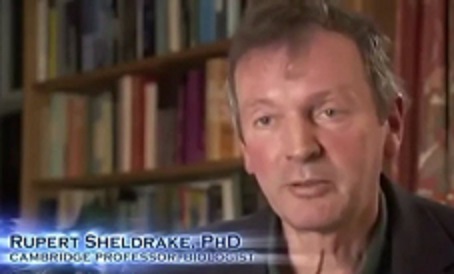|
home | what's new | other sites | contact | about |
||
|
Word Gems exploring self-realization, sacred personhood, and full humanity
Dr. Rupert Sheldrake the mind's epicenter is not found in the brain; therefore, consciousness is not extinguished, and continues on, when the physical body fails
See an excellent interview of Dr. Sheldrake by Alex Tsakiris of skeptiko.com Also see extensive discussion of Dr. Sheldrake's books on the "Evolution" page. The following biographical information is taken from Dr. Sheldrake's official website:
Dr. Sheldrake’s professional record:
Few writers or thinkers in the world tempt me toward superlatives. I make an exception in the case of Rupert Sheldrake. He is the quintessential British intellectual, a model and standard, in my opinion, of what a first-rate mind looks like: unprejudiced, thoughtful, always the gentleman even when attacked, witty, fearless to challenge dogmatism and vested interests, spiritually minded, and a scholar's scholar. I hope to someday emulate his best. The work of Rupert Sheldrake cannot be reduced to a slogan or 1-minute sound-bite. His extensive research over decades is truly ground-breaking, paradigm-shattering, and threatens to upend conventional science. If you think I speak ill-advisedly here, I suggest you read Rupert's Science Set Free...
... wherein he exposes flaws in 10 major tenets of modern science - things we were taught in high school and college, but, in fact, are not true. Much of the error stems from a materialistic view of the universe and of reality itself. And one of these slain "infallible doctrines" of science concerns the brain, which, it is commonly held, stores our memories and serves as the seat of consciousness. Dr. Sheldrake's research strongly suggests that this is not true. This subject is far too vast, and, lest it be trivialized, far too important to address here. As primers, I would encourage you to view Dr. Sheldrake's lectures on Youtube [search for the keywords "morphic fields/resonance"]. You'll also want to survey his books exploring telepathy in both humans and animals.
Quotes from Rupert Sheldrake: Contemporary science is based on the philosophy of materialism, which claims that all reality is material or physical. I went through the standard scientific atheist phase when I was about 14. I bought into that package deal of science equals atheism. I’m not confident memories are stored in brains. I think that brains are more like tuning devices, more like TV receivers than like video recorders. Now that’s really a scientific question, how is memory stored? We can do experiments to try and find out how memory works. It has religious implications because materialism says that memories are stored in brains. The brain decays at death, therefore, memories are wiped out at death. There’s no possibility of any kind of personal survival without memory.
In practice, the goal of skepticism is not the discovery of truth, but the exposure of other people's errors. It plays a useful role in science, religion, scholarship, and common sense. But we need to remember that it is a weapon serving belief or self-interest; we need to be skeptical of skeptics. The more militant the skeptic, the stronger the belief. The facts of science are real enough, and so are the techniques that scientists use, and so are the technologies based on them. But the belief system that governs conventional scientific thinking is an act of faith. Science at its best is an open-minded method of inquiry, not a belief system. I have been a scientist for more than 40 years, having studied at Cambridge and Harvard. I researched and taught at Cambridge University, was a research fellow of the Royal Society, and have more than 80 publications in peer-reviewed journals. I am strongly pro-science. Right now, any opinion anyone has about whether dogs can or cannot really tell when their owner is coming home by some unknown means... nobody knows. The weight of evidence suggests they can. It’s almost as if science said, “Give me one free miracle, and from there the entire thing will proceed with a seamless, causal explanation.” The one free miracle was the sudden appearance of all the matter and energy in the universe, with all the laws that govern it. I still say the 'Lord's Prayer' every day. It covers a lot of ground in our relation to the world. The assumption that the laws of nature are eternal is a vestige of the Christian belief system that informed the early postulates of modern science in the seventeenth century. Perhaps the laws of nature have actually evolved along with nature itself, and perhaps they are still evolving. Or perhaps they are not laws at all, but more like habits.” The morphic fields of mental activity are not confined to the insides of our heads. They extend far beyond our brain though intention and attention. We are already familiar with the idea of fields extending beyond the material objects in which they are rooted: for example magnetic fields extend beyond the surfaces of magnets; the earth's gravitational field extends far beyond the surface of the earth, keeping the moon in its orbit; and the fields of a cell phone stretch out far beyond the phone itself. Likewise the fields of our minds extend far beyond our brains.
|
||
|
|


